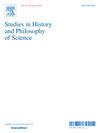Reactivity, validity, and measurement in the social sciences
IF 1.8
2区 哲学
Q1 HISTORY & PHILOSOPHY OF SCIENCE
引用次数: 0
Abstract
Reactivity takes place when being measured or classified affects a subject's attitudes and behaviour to such an extent that this affects results in (subsequent) measurement or classification. How one should recognize and evaluate such changes over time is a prominent topic in the psychometric literature, where it falls under the broader concept of response shift. A key question in that literature is if reactive changes are ever natural, that is, whether there are cases in which the measurement results before and after the shift are both accurate to the underlying phenomenon. This is thought to depend on what causal regularities obtain in the area of study, but also on whether the phenomenon is in part constituted by normative and changeable evaluations by the respondent. While the naturalness of reactivity is typically discussed exclusively at the level of measures of individual respondents, much philosophical attention has also been spent in recent years on the reactivity in measurement of macro-social entities, like countries and institutions. This article offers conceptual clarification for that new field by mapping concepts from psychometrics to the measurement of macro-social phenomena. In particular, this article distinguishes two existing arguments about the naturalness of reactivity in psychometrics (‘the argument from regularity’ and ‘the argument from strong evaluation’) and shows what is needed to extrapolate them fruitfully, by focusing on two examples of public measures, viz., democracy indicators and university rankings.
社会科学中的反应性、有效性和测量
当被测量或分类对被测者的态度和行为产生一定程度的影响,从而影响(随后的)测量或分类的结果时,就会发生反应性。一个人应该如何认识和评估这种随时间的变化是心理测量学文献中的一个突出主题,它属于更广泛的反应转移概念。这些文献中的一个关键问题是,反应性变化是否总是自然的,也就是说,在这种情况下,变化前后的测量结果是否都准确地反映了潜在的现象。这被认为取决于在研究领域中获得的因果规律,但也取决于该现象是否部分由被调查者的规范性和可变评价构成。虽然反应性的自然性通常只在个体受访者的测量水平上进行讨论,但近年来,许多哲学关注也花在了衡量宏观社会实体(如国家和机构)的反应性上。本文通过将心理测量学的概念映射到宏观社会现象的测量,为这一新领域提供了概念上的澄清。特别是,本文区分了关于心理测量学中反应性的自然性的两种现有论点(“来自规律性的论点”和“来自强评估的论点”),并通过关注两个公共措施的例子,即民主指标和大学排名,展示了需要什么来有效地推断它们。
本文章由计算机程序翻译,如有差异,请以英文原文为准。
求助全文
约1分钟内获得全文
求助全文
来源期刊

Studies in History and Philosophy of Science
管理科学-科学史与科学哲学
CiteScore
2.50
自引率
10.00%
发文量
166
审稿时长
6.6 weeks
期刊介绍:
Studies in History and Philosophy of Science is devoted to the integrated study of the history, philosophy and sociology of the sciences. The editors encourage contributions both in the long-established areas of the history of the sciences and the philosophy of the sciences and in the topical areas of historiography of the sciences, the sciences in relation to gender, culture and society and the sciences in relation to arts. The Journal is international in scope and content and publishes papers from a wide range of countries and cultural traditions.
 求助内容:
求助内容: 应助结果提醒方式:
应助结果提醒方式:


